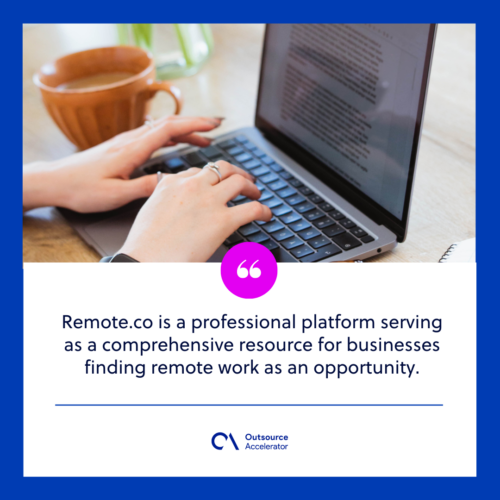How to Build an Effective Group of Remote Professionals
In today's increasingly electronic landscape, the ability to develop an effective group of remote professionals is important for organizations aiming to prosper. Key aspects such as specifying clear goals, cultivating efficient communication, and picking proper partnership devices play a pivotal role in this process. Nonetheless, it is the subtler facets-- like nurturing a cohesive business society and promoting constant understanding-- that can truly set a remote team apart. Comprehending just how to integrate these components may raise more concerns than responses, especially when taking into consideration the one-of-a-kind challenges that remote work presents.
Specify Clear Goals and Expectations
Frequently developing clear goals and assumptions is vital for the success of a remote group (Remote Professionals). Without these elements, staff member might experience complication concerning their roles, duties, and the general purposes of the project. This obscurity can bring about lowered efficiency, misaligned efforts, and eventually, task failing
To define clear goals, it is essential to employ the wise standards-- Particular, Quantifiable, Possible, Pertinent, and Time-bound. This approach ensures that each objective is distinct and can be efficiently interacted to all staff member. In addition, it is necessary to align specific goals with the overarching vision of the company, fostering a sense of function and dedication among staff member.
Foster Effective Communication

Regular check-ins and team conferences can aid preserve a solid communication flow, enabling members to share progression updates and go over any roadblocks they might encounter. It is additionally crucial to identify that different people might have differing communication designs. Comprehending and accommodating these distinctions can result in more purposeful interactions and a more cohesive team dynamic.
Urge team members to articulate their ideas succinctly and to seek information when needed. By prioritizing efficient communication, remote groups can boost efficiency, reinforce connections, and produce a more inclusive job atmosphere, eventually leading to higher success in accomplishing typical objectives.

Make Use Of the Right Devices
To sustain effective interaction within a remote team, it is essential to utilize the right tools that assist in collaboration and improve process. The choice of devices can considerably influence performance, ensuring that employee remain connected and engaged in spite of geographical distances.
Begin by applying project monitoring software program, such as Trello or Asana, to arrange tasks, established deadlines, and track progression. This fosters accountability and provides visibility into each member's contributions. Furthermore, interaction systems like Slack or Microsoft Teams provide immediate messaging abilities, allowing real-time conversations and fast Homepage decision-making.
Video conferencing devices, such as Zoom or Google Meet, are necessary for in person interactions, which assist develop connection and enhance partnerships among group members. In addition, record sharing and storage solutions like Google Drive or Dropbox guarantee that essential files are editable and available by all staff member, advertising cooperation on tasks.
Incorporating these tools efficiently produces an atmosphere where remote professionals can prosper. By picking the ideal innovation, companies can improve interaction, boost task management, and ultimately attain their objectives much more successfully.
Build a Solid Firm Culture
Developing a strong business society within a remote group is important for cultivating interaction and commitment amongst employees. A distinct culture offers a sense of belonging and shared objective, which is essential when employee are dispersed throughout different areas. To cultivate this culture, leaders must develop clear worths and expectations that resonate with employees, making certain that every person recognizes the objective and vision of the company.
Normal communication is vital in reinforcing this society. Making use of video clip phone calls, group meetings, and casual check-ins can help keep links and advertise openness. In addition, commemorating success, both tiny and big, strengthens a culture of acknowledgment and appreciation.
Encouraging group collaboration through virtual systems not only enhances efficiency however additionally fosters social partnerships - Remote Professionals. Organizing online team-building tasks can further strengthen bonds among group members, making them really feel extra incorporated into the company
Finally, it is necessary to basics listen to worker responses and adapt as required. By showing that their voices issue, leaders can build count on and loyalty, ultimately producing a prospering remote workplace where employees really feel valued and engaged.
Urge Constant Knowing and Growth
A strong firm society lays the groundwork for motivating continuous understanding and advancement within a remote team. By cultivating an atmosphere that values development, companies can equip staff members to enhance their abilities, adjust to new difficulties, and eventually contribute extra properly to team objectives.
To promote continuous learning, consider implementing regular training sessions, workshops, and webinars that line up with both individual profession objectives and organizational demands. Take advantage of technology to facilitate accessibility to e-learning systems, making certain that resources are easily available for remote employee.
Urge expertise sharing by developing mentorship programs and creating forums for employees to exchange insights and best methods. Rewarding and recognizing employee who actively participate in learning campaigns reinforces the relevance of growth and inspires others to adhere to fit.
In addition, carrying out regular feedback sessions can aid determine skill voids and areas for enhancement, enabling tailored growth strategies. By prioritizing constant learning and development, remote teams can grow a culture of flexibility, development, and resilience, which are necessary for navigating the intricacies of today's company landscape.
Verdict
In verdict, the facility of an effective remote group rests on the integration of clear objectives, efficient interaction, suitable devices, a robust business society, and continual knowing possibilities. By lining up specific contributions with organizational purposes and cultivating an environment of openness and cooperation, remote professionals can flourish. Remote Professionals. The execution of these approaches not just enhances group communication yet additionally drives inspiration, inevitably causing enhanced performance and success in a remote working landscape
It is the subtler elements-- like nurturing a natural business society and promoting continuous understanding-- that can absolutely set a remote group apart.Effective interaction is the cornerstone of a prospering remote group. By focusing on reliable communication, remote groups can boost productivity, enhance relationships, and develop a more inclusive work setting, inevitably leading to better success in accomplishing typical objectives.
Creating a strong business culture within a remote team is necessary for cultivating engagement and commitment among staff members.In final thought, the establishment of a successful remote group pivots on the integration of clear goals, reliable interaction, ideal devices, a see this website robust firm culture, and constant understanding possibilities.